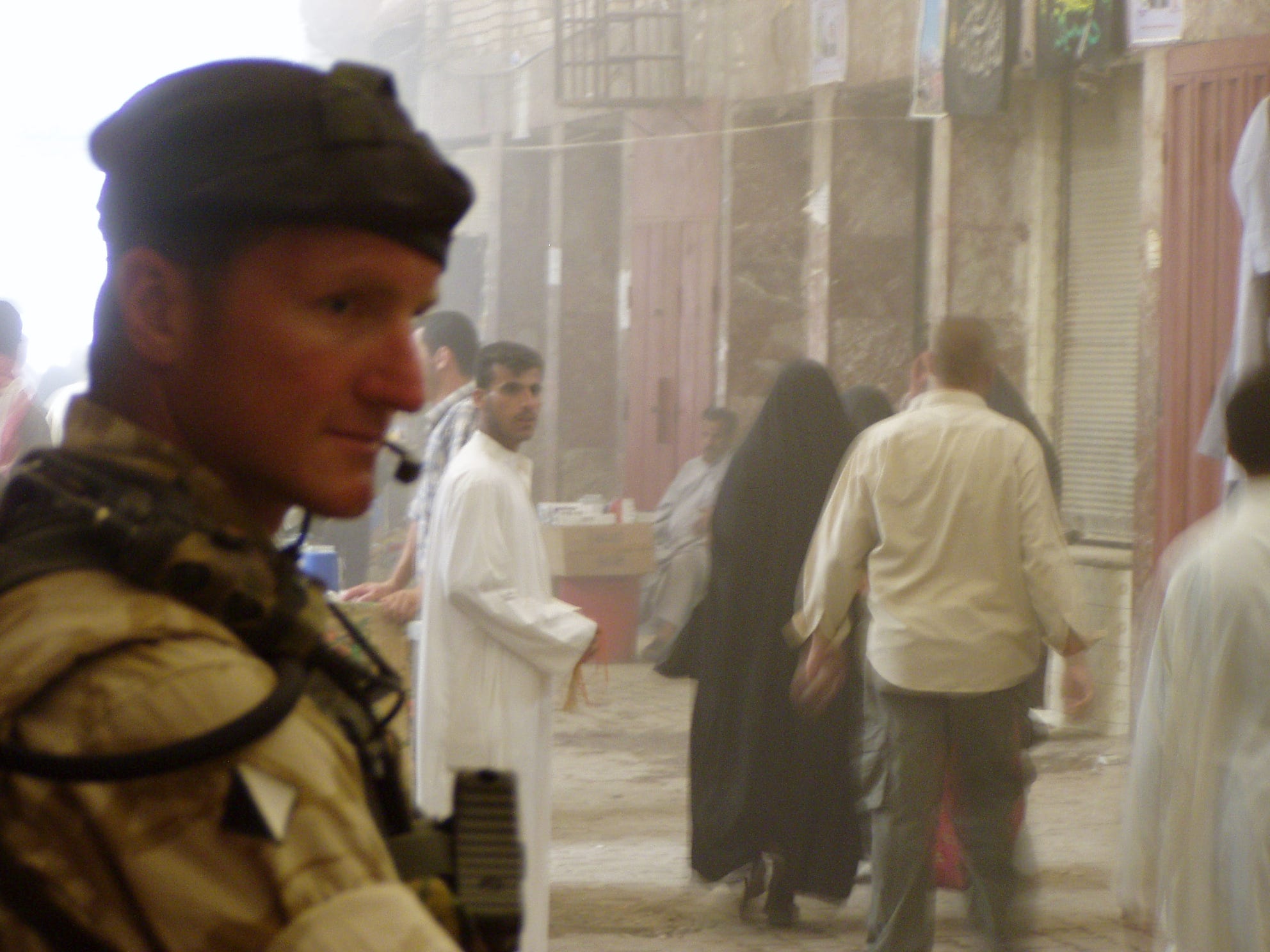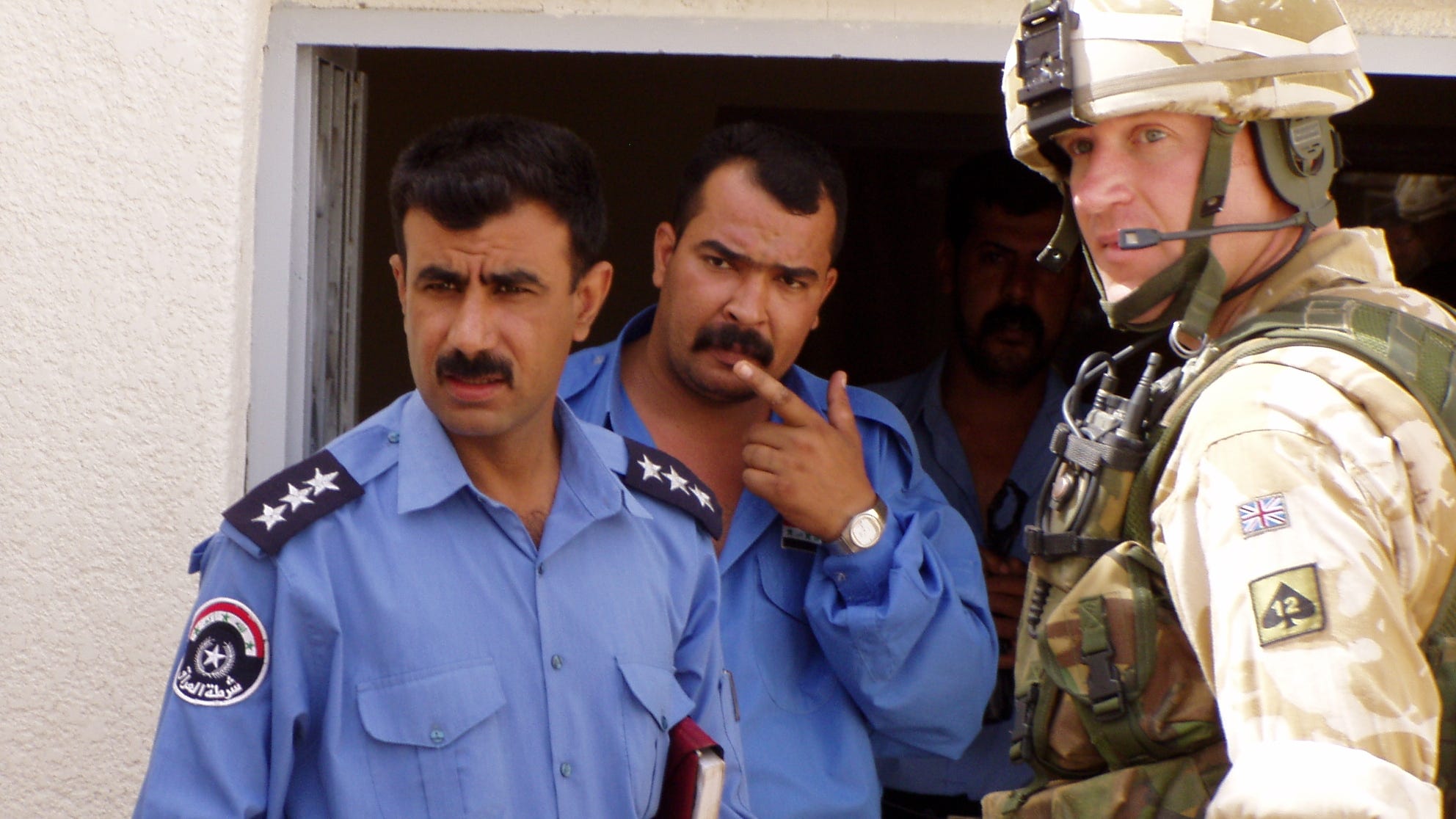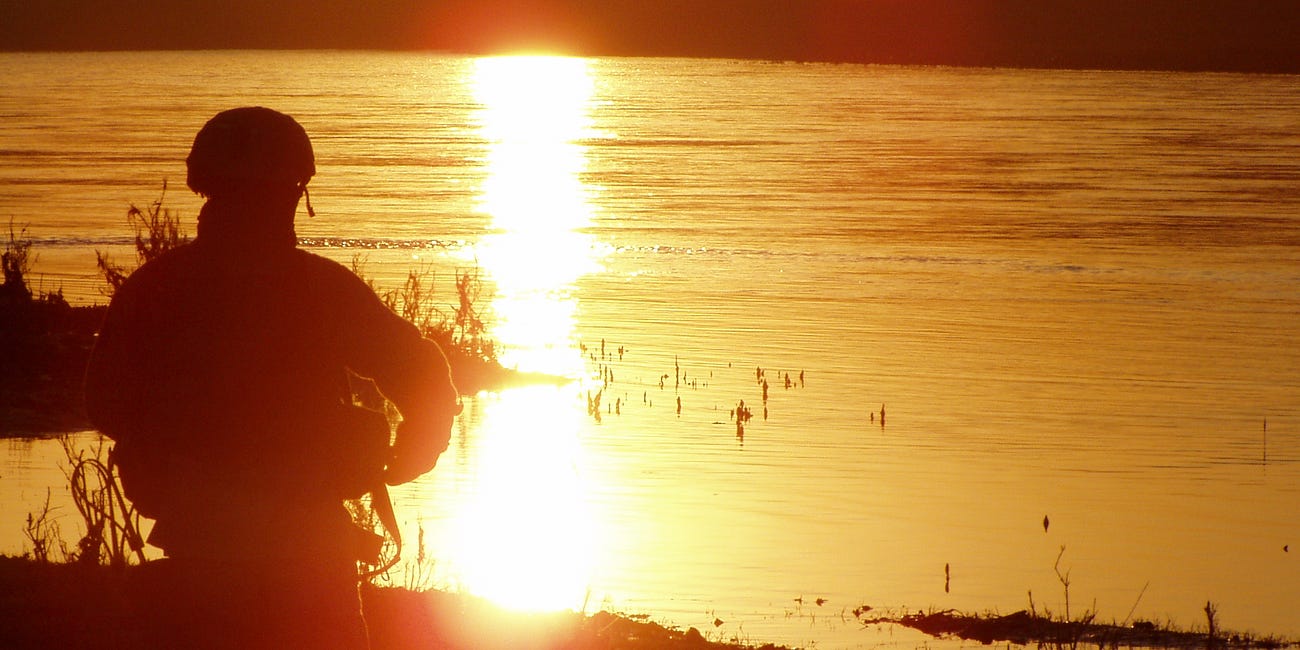Between February 2005 and March 2006, I traveled to Iraq several times for The Village Voice—the New York City alternative newspaper that folded in 2017 and now reappears only sporadically. I wrote 16 stories for The Village Voice. The paper paid me $1,000 for each, essentially launching my writing career. This story The Village Voice appeared in July 2005.
A crowd of angry Iraqis gathers. Opposite it, behind shields, wielding batons, wait British soldiers from the Royal Irish Regiment. The mob advances, hurling flaming Molotov cocktails. Bodies crash. People fall flailing. Then referees intervene, pulling apart the combatants.
It’s June 10, 2005 at Catterick, a British Army base in northern England. The “Iraqis” are actually British soldiers. In every direction there’s just cows and farmhouses. It’s the farthest thing from Iraq, but it’ll have to do.
In July 2005, the Royal Irish’s 500 soldiers deploy to Iraq for six months—their second stint since the 2003 invasion. This is their last chance to train for what could be the penultimate major rotation of British troops; a memo leaked to The Mail newspaper last week outlined plans to withdraw most U.K. forces by April 2006.
The Royal Irish will man two detachments: one at a logistics base in southern Iraq and another in Baghdad. One promises relative quiet. The other guarantees firefights and bombings.
How the British Army prepares for and executes such disparate missions is testimony to centuries of experience fighting in places like Iraq. And it informs a debate that has raged since 2003 over whether the reputedly “softer” British approach to occupation is better than the “heavy-handed” American approach.
It’s a debate that’s becoming more relevant as British forces move close to declaring victory and leaving Iraq, while American forces seem likely to remain in the country for years to come.
A balanced view finds more similarities than differences in the two nations’ methods. The differences—and the different timelines for their respective forces’ withdrawals—stem from the regions the nations occupy: the British have 10,000 troops in Shi’ite southern Iraq while the U.S. has 150,000 in the Sunni triangle, the volatile western desert and the contested north. In two years, the British have lost 88 soldiers; the U.S., more than 1,700.
The 2003 invasion of Iraq was “U.S.-led,” but Britain has a longer history than the U.S. of meddling in Iraq. The British first occupied the country in 1915, installing an independent monarchy. British troops returned several times to squash revolts. In 1941, revolutionaries courted Germany, prompting Britain to reoccupy Iraq until 1945. The monarchy was overthrown in 1958 and replaced by increasingly authoritarian regimes that culminated in Saddam Hussein in 1979.
Iraqis haven’t forgotten Britain’s history in their country. At a June 7, 2005 meeting in Basra between Transport Minister Salam Auda Al Maliki and the British Foreign Office, talk turns to a comparison of British and American methods. “Americans face violence with violence,” Al Maliki says. He gazes at the Foreign Office officials and says that the British are less aggressive. “You’ve been here before.”
Al Maliki isn’t the only one to perceive a difference. In April 2004, Britain’s The Telegraph newspaper published an anonymous British officer’s accusations that Americans killed indiscriminately.
“The Americans' use of violence … is over-responsive to the threat they are facing,” The Telegraph reported the officer saying. “They are not concerned about the Iraqi loss of life in the way the British are."
The officer’s accusations ignore examples of British heavy-handedness. In 2003, aggressive arrests by British forces in Majar Al Kabir sparked a riot that killed four Iraqis and six British soldiers.
Regardless, the officer’s claims gained traction. In April 2005, the British House of Commons report stated, “Excessive use by the U.S. forces of overwhelming firepower has also been counterproductive, provoking antagonism toward the coalition.”
The same opinion is ingrained throughout the British Army. Maj. Hugo Clark, 35, the man orchestrating the Catterick training, acknowledges that the British have an advantage of institutional experience over the Americans. He likens Iraq to Northern Ireland in the 1970s. Still, he says, comparing American behavior in the Sunni triangle to British actions in Shi’ite southern Iraq is unfair.
After one convoy exercise where soldiers in Land Rovers are surrounded by five vans filling in for Baghdad traffic, Clark tells the soldiers they have seconds to decide whether to fire on suspicious vehicles. “That’s five vehicles. Just think what Baghdad is going to produce. You’re beginning to understand the environment the Americans are working in.”
It’s an environment the Royal Irish will know very well. Maj. Edward Mason, 37, says that his soldiers will take turns manning the Baghdad detachment, meaning they will alternate between greatly different environments.
“In Baghdad, with the suicide bombing threat, you’ve got to keep people at arm’s length,” Clark says. “But in the south, people can be pretty favorable. You don’t want to keep them at arm’s length.”
That’s easier said than done. The cultural divide between the insular southern tribes and their British occupiers is as wide as that between the Americans and their subjects up north. Helping soldiers bridge the gap is one of Clark’s goals. His success doing so belies centuries of colonial tradition.
Clark says the June 10, 2005 riot exercise simulates a worst-case scenario.
With radical cleric Muqtada Al Sadr moving toward legitimacy, violent demonstrations are rare in southern Iraq, Mason says.
But Clark says British forces must be prepared for the worst. “We’re an army. Our job is to apply force. But … you need the ability to apply force selectively.”
After all, Clark says, success means winning Iraqis’ consent. He says that in southern Iraq, the people are the best weapon against insurgents. “For instance, the best [roadside bomb] detector is the local populace. But they’re not going to help you if they don’t like you.”
In another corner of Catterick, 2nd Lt. Kevin Wild, 20, sits in a room with a translator opposite a local Arabic teacher playing an Iraqi sheik. Wild greets the sheik in Arabic and says he’s here to hear the sheik’s concerns.
The sheik speaks through the translator: “Why isn’t your commander here to see me?”
Wild struggles for a response that balances the truth—that the commander would be too busy to meet every sheik every day—with the mission: to make nice in a place where the populace is on the brink of revolt. “He looks forward to meeting you at a later date,” Wild says.
The sheik nods. Wild looks relieved.
Balancing combat skills against the softer skills needed to win over a sometimes hostile populace is a challenge the British Army has faced for centuries; recently, in Northern Ireland. With colonies occupied by small garrisons, the British relied on local consent to maintain their empire. Where the consent dissolved, the colonies failed—like in India and America … and in Iraq.
History has taught the British Army hard lessons. The U.S. Army seemingly has learned the same lesson.
“We rely heavily on town leaders,“ says Capt. Mike Yea, 29, from the U.S. 25th Infantry Division, deployed to the northern town of Qayyarah.
On March 27, 2005, Capt. Ran Gist, 29, drops in on Qayyarah's Sheik Ishmael and, after tea and small talk in Arabic, tells him the U.S. needs his help identifying terrorists.
This is exactly the scenario Wild’s Catterick simulation anticipates. And it’s the cornerstone of American and British strategy across Iraq, both in Qayyarah and in the southern province of Muthanna.
“You can’t be a stranger in Muthanna,” says Col. Niall Campbell, 48. From Camp Smitty near Samawah, Campbell’s 500 soldiers patrol the poorest part of Iraq, protecting a contingent of Japanese engineers building a $150-million power plant.
“There ain’t a lot of money here,” Campbell says. Decades of neglect by Baghdad have ruined the province’s infrastructure and seeded suspicion in its people. This is useful for keeping Sunni insurgents out, Campbell says, but it also presents a challenge to the occupiers. How does a western army overcome Muthanna’s hostility towards foreigners?
By meeting them on their terms, Campbell says. He communes regularly with the province’s sheiks and politicians.
His tactics sound like those described by Lt. Col. Bradley Becker, Gist’s commander in Qayyarah. Becker has won over even Ahmed Fathi, Qayyarah’s Sunni religious leader.
After much diplomacy, Muthanna’s leaders are now “embarrassingly friendly” with the British, Campbell says. He draws a gilded blade, a gift from a local leader. It helps that people here are “pathetically grateful that Saddam Hussein is gone,” Campbell adds.
This is the critical difference between the British and U.S. zones, according to Clark. The Sunni insurgency in the U.S. zone continues unabated, killing more than 50 Americans in April and May 2005. The British lost two soldiers in the same period. “There’s just not a Sunni problem” in southern Iraq, according to British Lt. Col. Andrew Williams, commander in Maysan province.
Still, British forces work hard to maintain local consent. Among those on the front line is Lt. Sqot Wiseman, 28. On one June 6, 2005 patrol through a Samawah marketplace, armed but without their helmets, Wiseman and his soldiers plunge into a crowd, greeting shoppers in stilted Arabic. Wiseman pauses at a shop to hear 55-year-old Sayid Hessan’s gripes about power, water and occupation. “When will the U.K. leave?” Hessan demands.
Wiseman says foreign forces will leave when Muthanna is self-sufficient—the line Americans recite elsewhere. Iraqi preparedness is the major condition cited in the withdrawal plans leaked to The Mail.
Back at Smitty, Campbell says the coalition will stay until the Iraqi Army gains confidence and major reconstruction projects finish. Again, it’s like he’s reading the American script, and stressing the prerequisites for a 2006 withdrawal. “We’re not going to be here forever. Nor are we in an unseemly rush to leave.”
In the meantime, men like Wiseman tread lightly in Muthanna, betraying some of the differences between their tactics and Americans’. Soldiers here patrol in Land Rovers, vehicles much smaller than American Humvees. As a result, says British Army spokesman Capt. Muir Sterling, British forces inflict fewer delays on Iraqi commuters and cause fewer accidents.
On patrols through markets, British soldiers often remove their helmets to appear friendlier. Americans, patrolling more dangerous areas, rarely do so. But it’s hard to say if that really makes a difference to an already hostile Sunni population.
If there’s one notable difference between British and U.S. forces in Iraq, it’s in their adoption of Arabic. British forces go out of their way to speak some Arabic, even if badly. U.S. troops are less likely to even try.
Wiseman, for his part, has been introducing himself to Iraqis in Arabic, saying, “Your name is Sqot.”
Back at Catterick, Mason says the Royal Irish sends a third of its troops through a basic Arabic course. He wanted to send soldiers to a three-month Arabic course, but the training schedule hasn’t allowed it. Still, British units deploy with greater Arabic skill than their American equivalents. On patrols like Wiseman’s, such skill is evident, although its value is unclear.
In the Samawah market, Wiseman picks up an escort of Iraqis: kids begging for candy, men asking about reconstruction. Emerging at the exit where the Land Rovers approach, neatly inserted into traffic, Wiseman waves goodbye. His subjects wave back.
No gunfire. No riots. While up north, cars explode and people die, here peace and consent have been maintained another day, bringing the region closer to lasting security and paving the way for the occupation's orderly end, beginning perhaps as early as April.
But to say a uniquely British approach is the key to that consent is unfair when Americans take most of the same measures and are rewarded with bloodshed.
Read more:
The Road to Mosul
Between February 2005 and March 2006, I traveled to Iraq several times for The Village Voice—the New York City alternative newspaper that folded in 2017 and now reappears only sporadically. I wrote 16 stories for The Village Voice. The paper paid me $1,000 for each, essentially launching my writing career.








